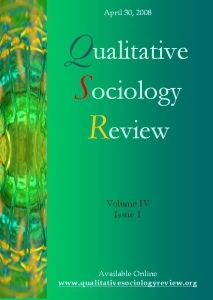Crafting Blindness: Its Organizational Construction in a First Grade School
DOI:
https://doi.org/10.18778/1733-8077.4.1.05Keywords:
Blindness, Social construction, Disability studies, Organization, Grounded theory, Ethnomethodology, Ethnography, ErgonomicsAbstract
This article is based on a case study conducted in an Italian primary school where the interactions between a sightless girl (named Jasmine, aged 8) and her classmates were extensively observed. The initial aim was to understand and describe the problems encountered by the sightless pupil, who acted in a social, organizational and physical environment which was not designed for handicapped people. However, other theoretical issues emerged during the research. The main finding was that sightlessness seems socially and organizationally constructed before it becomes a biological/physical handicap. The organizational processes through which the blindness is slowly and routinely constructed were extensively described.
Downloads
References
Cicourel, Aaron V. (1973) Cognitive Sociology. London: Macmillan.
Google Scholar
Cicourel, Aaron V. (1996) “Ecological validity and white room effects.” Pragmatics & Cognition, 4(2): 221-264.
Google Scholar
DOI: https://doi.org/10.1075/pc.4.2.04cic
Corsaro, William (1985) Friendship and Peer Culture in the Early Years. Norwood, N.J.: Ablex Publishing Corporation.
Google Scholar
Davis, Lennard J. (1997) The Disability Studies Reader. New York and London: Routledge.
Google Scholar
Garfinkel, Harold (1967) Studies of Ethnometodology. Englewood Cliffs: Prentice Hall.
Google Scholar
Gilbert, Nigel and Michael Mulkay (1983) “In search of the action.” Pp. 8 - 34 in Accounts and Action, edited by N. Gilbert & P. Abell. Aldershot: Gower.
Google Scholar
Goffman, Erving (1956) “Embarrassment and Social Organization.” American Journal of Sociology 3: 264-274.
Google Scholar
DOI: https://doi.org/10.1086/222003
Goffman, Erving (1961) Asylums. Essays on the Social Situation of Mental Patients and Others Inmates. New York: Doubleday.
Google Scholar
Goode, David (1994) A World Without Words: The Social Construction of Children Born Deaf and Blind. Philadephia: Temple University Press.
Google Scholar
Goode, David (1979) “The world of the deaf-blind.” in Qualitative Sociology: A method to the madness, edited by H. Schwartz and J. Jacobs. New York: Free Press.
Google Scholar
Gusfield, John (1982) “Deviance in the welfare state: the alcoholism profession and the entitlements of stigma.” in Research in the Social Problems and Public Policy, Vol. 2, edited by M. Lewis. Greenwich, CT: JAI press.
Google Scholar
Heritage, John (1984) Garfinkel and Ethnomethodology. Cambridge: Polity Press.
Google Scholar
Lane, Harlan (1997) “Construction of deafness.” Pp. 153 - 171 in The Disability Studies Reader , edited by L.J. Davis. New York and London: Routledge.
Google Scholar
Lester, Marilyn and Stuart C. Hadden (1980) “Ethnomethodology and Grounded Theory Methodology: An Integration of Perspective and Method.” Journal of Contemporary Ethnography 9(1): 3-33.
Google Scholar
DOI: https://doi.org/10.1177/089124168000900101
Merleau-Ponty, Maurice (1945) Phénomenologie de la perception. Paris: Gallimard.
Google Scholar
Olson C. (1981) “Paper barriers.” Journal of Visual Impairment and Blindness 15: 337- 339.
Google Scholar
DOI: https://doi.org/10.1177/0145482X8107500807
Olson C. (1977) “Blindness can be reduced to an inconvenience.” Journal of Visual Impairment and Blindness 11: 406-411.
Google Scholar
DOI: https://doi.org/10.1177/0145482X7707100910
Rosch, Eleanor (1978) “Principles of Categorization.” Pp. 28 - 48 in Cognition and Categorization, edited by E. Rosch and B.B. Lloyd. Hillsdale, New Jersey: Erlbaum.
Google Scholar
Rosch, Eleanor (1973) “On the internal structure of perceptual and semantic categories.” Pp. 111 - 144 in Cognitive development and the Acquisition of Language, edited by T.E. Moore. New York: Academic Press.
Google Scholar
Sacks, Harvey (1972) “On the analysability of stories by children.” Pp. 325 - 345 in Directions in Sociolinguistics, edited by J Gumperz and D Hymes. New York: Holt, Rinehart & Winston.
Google Scholar
Sacks, Oliver (1996) The Island of the Colorblind and Cycad Island. London: Picador.
Google Scholar
Sacks, Oliver (1989) Seeing Voices. A Journey Into the World of the Deaf. London: Picador.
Google Scholar
Schatzman, Leonard and Strauss Anselm L. (1973) Field Research: Strategies for a Natural Sociology. Englewood Cliffs, NJ: Printice-Hall.
Google Scholar
Scott, Robert A. (1969) The Making of Blind Men: A Study of Adult Socialization. New Brunswick, NJ: Transaction.
Google Scholar
Siperstein, Gary N. and John Bak (1980) Improving Children’s Attitudes Toward Blind Peers, in Visual Impair. Blindness 74(4): 132-135.
Google Scholar
DOI: https://doi.org/10.1177/0145482X8007400402
Strauss, Anselm and Juliet Corbin (1990) Basics of Qualitative Research. Grounded Theory Procedures and Techniques. London: Sage.
Google Scholar
Sudnow, David (1967) Passing On. The Social Organization of Dying. Englewood Cliffs: Prentice Hall.
Google Scholar
Vaughan, Edwin C. (1998) Social and Cultural Perspectives on Blindness: Barriers to Community Integration. Springfield, ILL: Charles C. Thomas Publisher.
Google Scholar
Vaughan, Edwin C. (1993) The Struggle of Blind People for Self-Determination: The Dependency-Rehabilitation Conflict: Empowerment in the Blindness Community. Springfield, ILL: Charles C. Thomas Publisher.
Google Scholar
Vaughan, Edwin C. (1991) “The social basis of conflict between blind people and agents of rehabilitation.” Disability, Handicap and Society 6: 203-217.
Google Scholar
DOI: https://doi.org/10.1080/02674649166780251
Vaughan, Edwin C. and James H. Omvig (2005) Education and Rehabilitation for Empowerment. Critical Concerns on Blindness. Greenwich, Conn.: IAP - Information Age Pub.
Google Scholar
Wright, Beatrice (1960) Physical Disabilities. New York: Harper.
Google Scholar
Downloads
Published
How to Cite
Issue
Section
License

This work is licensed under a Creative Commons Attribution-NonCommercial-NoDerivatives 4.0 International License.











